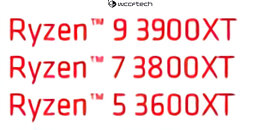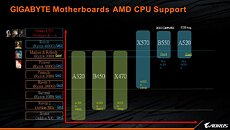Friday, May 22nd 2020

AMD "Matisse Refresh" Processor SKUs Include 3900XT, 3800XT, and 3600XT
Rumors of AMD refreshing its 3rd generation Ryzen desktop processor family are growing louder. On Friday (22/05), reports of the "Matisse Refresh" processor family surfaced, with talk of "Ryzen 7 3850X" and "Ryzen 7 3750X" processors headed for a June 2020 announcement followed by July availability. Turns out AMD has a different naming scheme in mind, targeted at wooing gamers. The company is reportedly bringing its "XT" brand extension over from its Radeon graphics card family over to the Ryzen line.
There are three SKUs AMD is developing, the Ryzen 9 3900XT, the Ryzen 7 3800XT, and the Ryzen 5 3600 XT. All three are likely to retain core counts of the SKUs they are displacing from current price points - with the 3900XT likely being a 12-core/24-thread part; the 3800XT an 8-core/16-thread part, and the 3600XT a 6-core/12-thread part. AMD is likely to give the three a major clock speed increase to shore up gaming performance. It won't surprise us if AMD tinkers with boost algorithms, either. GIGABYTE has already referenced "Matisse Refresh" in its motherboard product roadmaps, which adds plenty of credibilty to this rumor. With "Zen 3" based 4th gen Ryzen processors unlikely to relieve the embattled 3900X, 3800X, and 3600X in the wake of Intel's 10th gen Core "Comet Lake" launch until Q4-2020, it makes sense for AMD to plan a product stack refresh to bolster its competitiveness. AMD is reportedly planning a June 16 product announcement, followed by July 7 availability.
Sources:
WCCFTech, via VideoCardz
There are three SKUs AMD is developing, the Ryzen 9 3900XT, the Ryzen 7 3800XT, and the Ryzen 5 3600 XT. All three are likely to retain core counts of the SKUs they are displacing from current price points - with the 3900XT likely being a 12-core/24-thread part; the 3800XT an 8-core/16-thread part, and the 3600XT a 6-core/12-thread part. AMD is likely to give the three a major clock speed increase to shore up gaming performance. It won't surprise us if AMD tinkers with boost algorithms, either. GIGABYTE has already referenced "Matisse Refresh" in its motherboard product roadmaps, which adds plenty of credibilty to this rumor. With "Zen 3" based 4th gen Ryzen processors unlikely to relieve the embattled 3900X, 3800X, and 3600X in the wake of Intel's 10th gen Core "Comet Lake" launch until Q4-2020, it makes sense for AMD to plan a product stack refresh to bolster its competitiveness. AMD is reportedly planning a June 16 product announcement, followed by July 7 availability.


120 Comments on AMD "Matisse Refresh" Processor SKUs Include 3900XT, 3800XT, and 3600XT
We have been here a half dozen times before, overhyped AMD GPU prior and pretty weak product post leunch. Will it be different? I do think it will not be shit, as RDNA was already not shit. But performance crown? Nah, not happening...
"A mathematical problem is a problem that is amenable to being represented, analyzed, and possibly solved, with the methods of mathematics."
www.google.com/search?q=mathematical+problems&oq=mathematical+problem&aqs=chrome.0.0j69i57j0l5.6815j0j7&sourceid=chrome&ie=UTF-8Nvidia has only 2080 Ti with no where in sight anything better than it..
Performance crown is quite easy to achieve today, Nvidia has exactly zero N7 GPUs as of today.
But honestly, I have more expectations from Zen 3 than RDNA2…
Zen 4 will be much more important milestone in the development of the Zen-based micro-architectures :)
RDNA 2 is also very important because AMD needs to become competitive in the graphics department again.
We need that innovation with something new in the graphics, too.Maybe, maybe in March 2021, who knows... We will see but honestly why would launches from the corps coincide?Yeah, pretty much :(
Refresh of Zen 2 is not needed at this time. Many people said the Comet Lake was DoA. If it was DoA, why would AMD need to act now?
AMD doesn't plan to use DDR5 until 2022, so it makes me wonder if they will delay Zen 4 until 2022, or if it will support both memory types. Not that DDR5 matters to me, I'm just curious.
I have one machine overdue for a replacement, and another which is getting close. The next 1-1.5 years will be exciting, perhaps I'll build one machine from each team? :DI don't disagree with the need for competition and innovation in the graphics market. But my expectations of RDNA 2 is not that high, AMD have disappointed again and again.
And it's less new than it seams both no all companies iterate even Ryzens had some up carry over from the BD line, no one starts from scratch.
Literally any thread Can become the GPU argument thread on a whim.
7870 = dual shader engines GCN
R9-290/290X = quad shader engines GCN
...
RX 5700/5700 XT = dual shader engines RDNA
As reviews have shown, 10900K only enjoys a mid-thru-high single digit gaming performance lead, and a 10-15% nT non-gaming performance deficit over the 3900X. So AMD's goal would be to bring Intel's gaming performance lead down as much as possible (at least restore the ~2.5-4% lead it had with CFL), and push its nT performance lead close to 20%.18-22% price-cuts suggest otherwise.
It sounds boring, and yes, it really is :) The interesting bits for next gen will be how each camp scales with RT content and without it, while using their architectural update. How large the dies will be, how power management affects 'quality of life'... and how the perf/dollar will land. Whoever has the fastest... the vast majority is not in the market for it anyway. That 2080ti is really not a product in the stack IMO, it is priced way out of it. The details matter a lot more, and so far AMD has yet to show us details that truly bring benefits on the points mentioned here. RDNA was a small step in that direction, but still massively behind the curve.
When it comes to CPUs though, AMD has a much more reliable track record as of late, and it is actually them that are leading the curve, despite a minor, situational performance deficit (in ST). Intel has more catching up to do here; in die size/yield/node, in power management (quality of life - enter the delid or solder the lid ;) - still too hot, scales like shit when turboing)... The metrics are really the same, and none of them include me believing any sort of hype or marketing.
Don't think anyone disagrees about competitiveness, but saying it often won't make it so.
More importantly, I see far too many builders waste money on overpriced overclockable memory. Using something like 4000 MHz memory is not going to yield a substantial gain, and you are probably not able to run it reliably at that speed for 5+ years. People should rather buy affordable memory running at the highest JEDEC speed of their CPU and spend the money save on a CPU or GPU that's one tier higher.
It's a very serious reason not to buy anything CPU this year or H1 next year, and if you can wait for the new AM5 platform, then better wait.
Frankly, I seem to disagree with many in terms of CPU support. The reality with AM4 support ended up being having decent support for ~1 more generation, then perhaps partial support with some major compromises beyond that. For this support to matter to me, it needs to last at least 3-4 years of decent support and properly maintained BIOSes. There is just no point in upgrading a CPU after 1 year, that's a waste of money. The sad truth is that motherboard BIOSes are barely maintained beyond 1 year, so until they come up with motherboards which commits to proper long term support, I'm going to buy a new motherboard whenever I need a new CPU.
So for me, the choice between Zen 3 or Zen 4 would not be about sockets, but performance and CPU features (like AVX-512?).